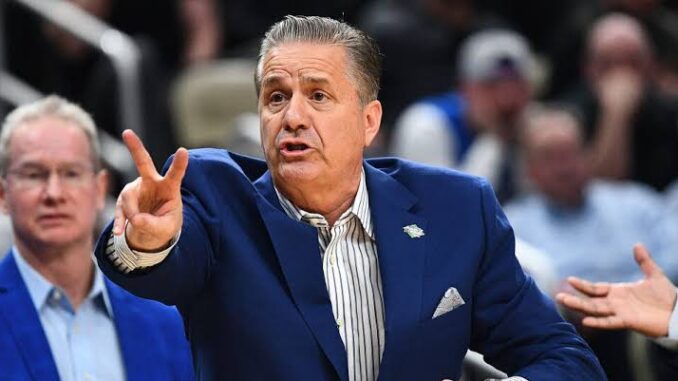
Huge Loss: Kentucky’s Key Player Announces Sudden Departure
In a stunning development that has sent shockwaves through the college basketball world, a key member of the Kentucky Wildcats has announced his unexpected departure from the program. This exit marks not only a significant loss on the court but also raises serious questions about the future trajectory of the storied Wildcats basketball team. As the Wildcats navigate this challenging period, the departure signals both an end of an era and the beginning of a new chapter for a program that has long been synonymous with excellence.
The Departure and Its Immediate Impact
The announcement came abruptly, leaving teammates, coaches, and fans alike reeling from the news. Kentucky’s guard Kerr Kriisa, whose contributions over the past seasons have been invaluable, has entered the transfer portal—a move that effectively removes him from the Wildcats’ roster. Kriisa’s decision was influenced by a season derailed by a severe foot injury, one that required surgery and limited him to just nine games. Despite the brevity of his recent season, his overall impact at Kentucky was undeniable. Kriisa averaged 4.4 points, 3.8 assists, and 2.4 rebounds in his limited appearances this season, numbers that barely hint at his potential when healthy.
During his collegiate career, including notable stints at Arizona and West Virginia, Kriisa established himself as a reliable point guard. His career averages of 9.3 points, 4.6 assists, and 2.3 rebounds per game underscore his importance to any team he has played for. For Kentucky, his departure represents a tangible loss in both leadership and playmaking ability—a gap that will be hard to fill as the Wildcats seek to remain competitive in an increasingly dynamic college basketball landscape.
Behind the Decision
While the full personal rationale behind Kriisa’s decision to leave Kentucky has not been disclosed publicly, it is clear that the foot injury played a critical role. Medical challenges in high-stakes sports often force athletes to reassess their career trajectories, and in Kriisa’s case, the injury seemed to have limited his contributions on the court. In light of his situation, he has opted for a medical redshirt—an opportunity to play one more NCAA season while ensuring his long-term health and effectiveness. For a player with his skill set and potential, the decision, although painful for fans, is a pragmatic move toward preserving his future in basketball.
Emotional Repercussions and Team Dynamics
The impact of Kriisa’s departure goes far beyond statistics. Kentucky’s recent season was marked by a palpable emotional intensity, particularly following a heartbreaking 78-65 loss to Tennessee in the Sweet 16. The post-game scene was emblematic of the deep bonds that exist within the team; head coach Mark Pope and senior guard Lamont Butler shared an emotional moment that resonated with fans and underscored the close-knit nature of the squad. Now, with one of their leaders choosing to pursue another path, the Wildcats face the dual challenge of rebuilding not only their roster but also the intangible team spirit that has driven their success over the years.
The sudden exit also raises concerns among fans about the broader implications for team cohesion. Kriisa was more than just a player—he was a mentor to younger teammates and a steadying influence during critical moments. His ability to run the offense and maintain calm under pressure will be sorely missed as the Wildcats adjust to this new reality.
Looking Ahead: Potential Replacements and Recruitment Strategies
In the wake of this major loss, Kentucky’s coaching staff and recruiting department have already begun exploring options to shore up the roster. One of the most talked-about possibilities involves Maryland guard Ja’Kobi Gillespie. Gillespie’s impressive performance this season—with averages of 14.7 points and 4.8 assists per game—has made him a hot commodity in the transfer market. Although Tennessee currently appears to be the frontrunner in landing Gillespie, the possibility of him joining the Wildcats remains an intriguing storyline that could redefine the backcourt dynamics for Kentucky. This recruitment battle underscores the broader challenge facing college basketball programs today, where talent mobility has become a central element of roster construction.
Adding another layer to the narrative is the situation involving Arkansas center Zvonimir Ivisic, affectionately known as “Big Z.” Ivisic, who had previously transferred from Kentucky to Arkansas last year, has now re-entered the transfer portal for a second time. His situation has created a sense of uncertainty in the frontcourt, as Kentucky has shown interest in retaining the versatile big man known for his solid rebounding and shot-blocking abilities. Ivisic’s journey highlights a trend in college basketball where players are increasingly seeking opportunities that align with their personal and professional goals—a trend that poses significant challenges for historically dominant programs like Kentucky.
The Wildcats’ aggressive pursuit of new talent is indicative of a broader shift in the sport, where programs must adapt to the realities of an ever-changing landscape. With the transfer portal reshaping recruitment strategies across college basketball, Kentucky’s ability to pivot quickly and secure top-tier talent will be a critical factor in maintaining its competitive edge.
The Broader Implications for College Basketball
Kriisa’s departure is emblematic of larger trends affecting college basketball. In an era when the transfer portal has become a staple of roster management, even programs with deep traditions and storied histories are not immune to the disruptions caused by player mobility. For Kentucky, this means that every loss on the roster must be counterbalanced with a strategic acquisition—a challenge that requires both astute scouting and a keen understanding of player potential.
Moreover, the emotional toll of such departures cannot be underestimated. Teams invest not only in the physical abilities of their athletes but also in their mental and emotional development. The loss of a key player like Kriisa can disrupt established routines and force the team to reconfigure its identity both on and off the court. This season’s narrative, punctuated by dramatic wins and heart-wrenching losses, has already taken its toll on the Wildcats. The sudden exit of one of their leaders is yet another blow to a program that has long prided itself on resilience and unity.
A Cautionary Tale for Aspiring Programs
For aspiring college programs and analysts alike, Kentucky’s current predicament serves as a cautionary tale. The modern college basketball landscape is defined by rapid changes and unprecedented levels of player movement. Programs that have historically enjoyed stability and long-term success now find themselves having to rebuild almost from scratch on several occasions. This volatility underscores the importance of adaptability—a quality that will be crucial for any program seeking to thrive in this new era.
In the case of Kentucky, the combination of injuries, transfers, and recruitment challenges converges to create a perfect storm. The departure of a player like Kriisa is not merely a temporary setback; it is a signal that even the most storied programs must continuously evolve to remain relevant and competitive. The Wildcats’ response to this challenge—whether through aggressive recruiting, tactical adjustments, or both—will likely set the tone for the future of college basketball in the Southeastern Conference and beyond.
Conclusion: An Uncertain Future and a Call to Resilience
As Kentucky grapples with the sudden loss of a key player, the road ahead is fraught with both uncertainty and opportunity. While the immediate impact is undeniable—a weakened backcourt, a disrupted team dynamic, and a void in leadership—the long-term implications may force the Wildcats to rethink their strategies and rebuild in ways that could ultimately lead to renewed success.
In the ever-evolving world of college basketball, adaptability is the name of the game. Kentucky’s current challenges, though daunting, offer a chance for growth and reinvention. For fans and analysts alike, the next few months will be a period of intense scrutiny as the program navigates this critical juncture. The loss of Kerr Kriisa is a reminder that in sports, as in life, change is inevitable, and resilience is measured not by how one falls, but by how one rises in the aftermath.
In this period of transition, the Kentucky Wildcats are tasked with not only finding suitable replacements but also preserving the core values and competitive spirit that have defined their legacy for generations. As the transfer portal continues to reshape rosters across the nation, Kentucky’s ability to adapt and rebuild will be watched closely by the entire college basketball community.
Ultimately, while the departure of Kerr Kriisa is a significant blow, it also presents an opportunity for the Wildcats to embrace change and forge a new path forward—one that honors the past while daring to innovate for the future. The coming season will undoubtedly test their resolve, but with strategic recruiting, smart management, and the enduring spirit of its players and supporters, Kentucky has every reason to believe that this setback could pave the way for a triumphant resurgence.
—
This in-depth report captures not only the immediate ramifications of a key player’s sudden departure but also situates the event within the broader context of modern college basketball—a sport where change is constant, and the ability to adapt often makes the difference between lasting legacy and fading tradition.



Be the first to comment